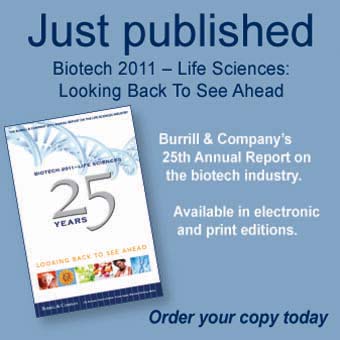The Burrill Report
The state of California has joined a lawsuit against Bristol-Myers Squibb that charges the drug giant illegally paid doctors kickbacks to boost sales of its drugs. Insurance Commissioner Dave Jones said his intervention in a whistleblower lawsuit against BMS represents the largest health insurance fraud case ever pursued by a California state agency. Former employees of BMS filed a whistleblower action under seal in Superior Court in Los Angeles alleging that BMS bribed doctors to prescribe BMS drugs. California is seeking monetary penalties and the disgorgement of millions of dollars in unlawful profits the company made as a result of kickbacks, plus treble damages. BMS told Bloomberg that it believes the lawsuit is without merit and that it will defend itself vigorously.
U.S. Senator Sherrod Brown, D-Ohio has asked the Federal Trade Commission to investigate KV Pharmaceuticals over what he characterized as the company’s efforts to monopolize the market for a drug to prevent pre-term labor. KV recently gained exclusive rights to sell the drug and plans to market it under the name Makena for $1,500 a dose. The drug, though, has long been available from compounding pharmacies at a cost of $10 to $20 a dose, the senator says. “KV created an overnight monopoly for this lifesaving drug – and then proposed raising the price by 14,900 percent,” Brown says. KV said it “takes very seriously the concerns raised about the list price of Makena” and that it “is committed to ensuring that this significant, FDA-approved medication is covered at an affordable cost and available to all women who are prescribed Makena, and looks forward to cooperating with the Members of Congress on these issues.”
Xoma said its experimental antibody Xoma 052 to treat type 2 diabetes failed in a mid-stage trial to achieve the study’s primary endpoint of reduction in glycosylated hemoglobin compared to placebo. Nevertheless, the company said biological activity of the drug supports its potential in cardiovascular disease with highly significant decreases in C-reactive protein, or CRP, a biomarker for the risk of heart attack, stroke and other cardiovascular diseases, in all dose groups versus placebo. Statistically significant improvements in high-density lipoprotein, or so-called “good” cholesterol were observed in two of four dose groups versus placebo. The company said the potent anti-inflammatory effects and continued positive safety profile reinforce its late-stage development program for Behcet's uveitis, which it expects to start this year pending completion of regulatory agency discussions.
Merck has notified Portola Pharmaceuticals that it plans to return all rights for betrixaban, an investigational oral Factor Xa inhibitor anticoagulant being evaluated for the prevention of stroke in patients with atrial fibrillation. The decision follows a review by Merck of its pipeline. In July 2009, Merck and Portola announced an exclusive global collaboration and license agreement for the development and commercialization of betrixaban. Betrixaban most recently completed a mid-stage trial that showed dose dependent clinical activity with similar or lower rates of bleeding compared to warfarin in the study population. Portola called Merck’s decision a “transformational opportunity” and said it will work with its academic partners on options for an independent development plan to bring betrixaban to the market.
Targacept said a mid-stage proof of concept trial of TC-5619, its experimental treatment for adults with attention deficit/hyperactivity disorder failed to meet its primary endpoint to show it was effective. TC-5619, a highly selective alpha7 neuronal nicotinic receptor modulator, is subject to license by Targacept's strategic collaborator AstraZeneca, with a decision expected in the second quarter of 2011. The ADHD trial, conducted in non-smokers, included a number of scales and assessments as secondary efficacy outcome measures. The results across a number of assessments indicate that TC-5619 had activity in patients, with TC-5619 outperforming placebo with statistical significance approximately seven times more often than placebo outperformed TC-5619 by the same standard. Analyses of the full dataset from the ADHD trial are ongoing, and Targacept plans to present more detailed results at a future scientific meeting.
San Diego-based Novalar will shut down now that it has sold off its sole product OraVerse, a drug that reverses the effects of local anesthesia, the San Diego Union Tribune reported. Company CEO Donna Janson told the newspaper that with no product candidates in its pipeline the company plans to soon shut down. The company said it will terminate its 12 employees in the next few weeks as it winds down operations. The company previously laid off its sales staff.
Cambridge, Massachusetts-based Peptimune, a privately-held biotech working on a generic version of the multiple sclerosis drug Copaxone, has filed Chapter 7 bankruptcy, the Boston Business Journal reported. The bankruptcy filing comes after failed efforts to raise a $35 million round of venture financing. The company, which has five employees, had already gone through significant downsizing. According to the filing the company had just over $2 million in assets thanks to the value of its intellectual property, but its debts total just under $2.2 million.
March 25, 2011
http://www.burrillreport.com/article-california_joins_whistleblower_lawsuit_against_bms_over_alleged_kickbacks_to_docs.html
TRIALS AND TRIBULATIONS
California Joins Whistleblower Lawsuit against BMS over Alleged Kickbacks to Docs
The weekly round-up of failed trials, missed targets, and other business mishaps.[Please login to post comments]

- Changing Medical Research through Social Media
Podcast: May 2, 2011 Read More - Fighting Parkinson's From Within
Lilly and Medtronic team up on implantable drug delivery device. Read More - Feds Turning up the Heat on Off-Label Marketing Violators
HHS Office of Inspector General considers excluding Forest Lab’s CEO from doing business with the government. Read More - J&J; Acquires Synthes for $21.3 Billion
Combination expands J&J; orthopedics portfolio. Read More - Aging and Lifestyle Take Global Toll
New WHO report finds deaths from noncommunicable diseases on the rise, with developing world hit hardest. Read More - Answering An Epidemic in Russia
Sequella could get up to $50 million in licensing deal that benefits both parties. Read More - Upcoming PDUFA Dates
Read More - Drug Approvals in 2011
Read More - SciClone Ramps Up in China with NovaMed Buy
Bigger portfolio, bigger sales force may cushion threats to earnings. Read More - BIO Sours on Patent Reform Legislation
Industry wants to kill amendment before floor vote. Read More

- A Fight Over How Drugs Are Pitched
The New York Times - White House announces plans to reduce prescription drug
Reuters - U.S. Cancer Doctors Back Genetic Tests to Assess Lung Cancer Patients
Bloomberg - Endo cuts patent risk with $2.6 billion American Medical
Reuters - Republican Medicare Plan Could Shape 2012 Races
The New York Times - Sanofi Chief details innovation strategy
Boston Business Journal - Cephalon Board Rejects Valeant’s Unsolicited $5.7 Billion Bid As Too Low
Reuters - Mouse Stem-Cell Discovery May Lead to Blindness Therapies, Researchers Say
Bloomberg - Drugs’ Cost and Safety Fuel a Fight
The New York Times - G.O.P. Blueprint Would Remake Health Policy
The New York Times





.gif)